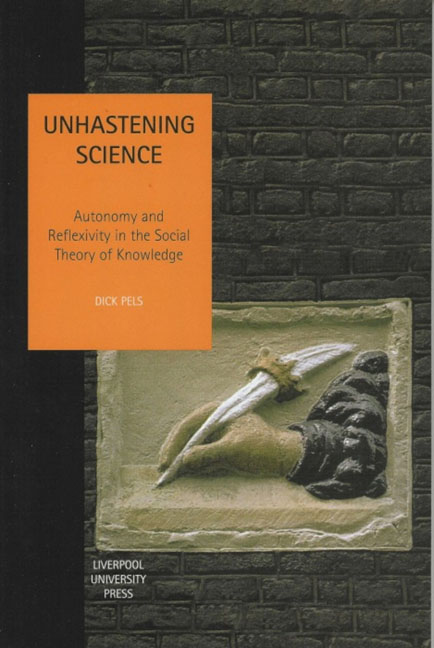Book contents
- Frontmatter
- Dedication
- Contents
- Acknowledgments
- 1 The Timescape of Science
- 2 What (Again) is So Special about Science?
- 3 Two Traditions in the Social Theory of Knowledge
- 4 The Natural Proximity of Facts and Values
- 5 Knowledge Politics and Anti-Politics: Bourdieu on Science and Intellectuals
- 6 The Politics of Symmetry
- 7 Reflexivity: One Step Up
- 8 Intellectual Autonomy and the Politics of Slow Motion
- Epilogue: Weak Social Theory
- Notes
- Bibliography
- Index
2 - What (Again) is So Special about Science?
- Frontmatter
- Dedication
- Contents
- Acknowledgments
- 1 The Timescape of Science
- 2 What (Again) is So Special about Science?
- 3 Two Traditions in the Social Theory of Knowledge
- 4 The Natural Proximity of Facts and Values
- 5 Knowledge Politics and Anti-Politics: Bourdieu on Science and Intellectuals
- 6 The Politics of Symmetry
- 7 Reflexivity: One Step Up
- 8 Intellectual Autonomy and the Politics of Slow Motion
- Epilogue: Weak Social Theory
- Notes
- Bibliography
- Index
Summary
Well, we've got time, haven't we, Socrates?
Plato, TheaetetusSelf-Interested Science
Twenty-five years of irreverent thinking and thick empirical description have done much to dislodge the long-standing philosophical conviction that science has a special, singularly compelling, and context-spanning rationality that legitimately dominates and adjudicates ordinary, local forms of reasoning (what used to be called ‘common sense’). It is no longer seen as the supreme legislator of all human knowledge, setting standards of truth and logic that automatically bridge disparate social and historical experiences, and defining universal principles of right reasoning and rules of proper method that explain its unique capacity to produce a truthful picture of the world. Increasingly, also, ‘science’ in the singular has come to be seen as bad shorthand for a vast plurality of practices, which are fragmented across many disciplines, niches, paradigms, and approaches. More dramatically, science has come to be viewed as just one culture of rationality among others, ‘just another story’, one among a plurality of perspectives, information bases, and interpretive communities, none of which can lay claim to a totalizing, overarching, or foundational status. The shockwaves that were generated by Feyerabend's rhetorical question ‘What is so special about science?’ (1978: 73) have gradually subsided, because the efforts of an entire generation of sceptical students of scientific and technological success have meanwhile been invested in arguing the implied answer: ‘Nothing really’.
This new emphasis upon the ordinariness of a core element of intellectual culture is not an isolated phenomenon but partakes of broader cultural mutations and social realignments, which have tended to desacralize high culture and brought it closer to the world of everyday meaning. A tradition has been building up from Benjamin's (1973 [1939]) ground-breaking proposition that the cultural realm was shedding its ‘auratic’ character and could no longer be separated on principle from the broader social realm. Indeed, some twenty years before Feyerabend mooted his iconoclastic question, Raymond Williams had already established a firm baseline for British cultural studies by emphasizing that ‘culture is ordinary’. In Williams’ estimate, culture was not confined to the arts and high learning, to the dazzling peaks of discovery and creativity, but included the ‘most ordinary common meanings’ next to the ‘finest individual meanings’.
- Type
- Chapter
- Information
- Unhastening ScienceAutonomy and Reflexivity in the Social theory of Knowledge, pp. 25 - 50Publisher: Liverpool University PressPrint publication year: 2003



